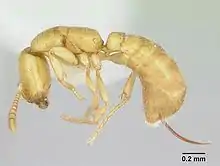Amblyoponinae
Amblyoponinae is a subfamily of ants in the poneromorph subfamilies group containing 13 extant genera and one extinct genus. The ants in this subfamily are mostly specialized subterranean predators.[1] Adult workers pierce the integument (non lethally) of their larvae and pupa to imbibe haemolymph, earning them the common name Dracula ant.[2]
| Amblyoponinae Temporal range: | |
|---|---|
 | |
| Adetomyrma venatrix worker | |
| Scientific classification | |
| Domain: | Eukaryota |
| Kingdom: | Animalia |
| Phylum: | Arthropoda |
| Class: | Insecta |
| Order: | Hymenoptera |
| Family: | Formicidae |
| Subfamily: | Amblyoponinae Forel, 1893 |
| Tribe: | Amblyoponini Forel, 1893 |
| Type genus | |
| Amblyopone Erichson, 1842 | |
| Genera | |
|
9 extant genera; 1 fossil genus[1] | |
Identification
Amblyoponinae is characterized by these worker characters: eyes small or absent, situated behind midlength of side of head; anterior margin of clypeus with specialized dentiform setae; promesonotal suture flexible; petiole very broadly attached to abdominal segment 3 and without a distinct posterior face; postpetiole absent; sting present and well developed.[1]
Systematics
The subfamily was formerly considered a tribe within Ponerinae, but was elevated to its own subfamily in 2003 when Barry Bolton divided Ponerinae into six subfamilies.[3]
- Amblyoponinae Forel, 1893
- Amblyoponini Forel, 1893
- Adetomyrma Ward, 1994
- Amblyopone Erichson, 1842
- †Casaleia Pagliano & Scaramozzino, 1990
- Fulakora Mann, 1919
- Myopopone Roger, 1861
- Mystrium Roger, 1862
- Onychomyrmex Emery, 1895
- Prionopelta Mayr, 1866
- Stigmatomma Roger, 1859
- Xymmer Santschi, 1914
- Amblyoponini Forel, 1893
References
- "Subfamily: Amblyoponinae". antweb.org. AntWeb. Retrieved 21 January 2021.
- WARD, PHILIP S.; FISHER, BRIAN L. (2 June 2016). "Tales of dracula ants: the evolutionary history of the ant subfamily Amblyoponinae (Hymenoptera: Formicidae)". Systematic Entomology. 41 (3): 683–693. doi:10.1111/syen.12186. ISSN 0307-6970.
- Fisher, Brian L.; Cover, Stefan P. (2007). Ants of North America: A Guide to the Genera. University of California Press. pp. 57–58. ISBN 978-0-520-93455-9.
 This article incorporates text from a scholarly publication published under a copyright license that allows anyone to reuse, revise, remix and redistribute the materials in any form for any purpose: Bolton, B. (2013), "An online catalog of the ants of the world.", AntCat, retrieved 22 September 2013 Please check the source for the exact licensing terms.
This article incorporates text from a scholarly publication published under a copyright license that allows anyone to reuse, revise, remix and redistribute the materials in any form for any purpose: Bolton, B. (2013), "An online catalog of the ants of the world.", AntCat, retrieved 22 September 2013 Please check the source for the exact licensing terms.
External links
 Media related to Amblyoponinae at Wikimedia Commons
Media related to Amblyoponinae at Wikimedia Commons
https://www.youtube.com/watch?v=KgqK0hrZ9kM